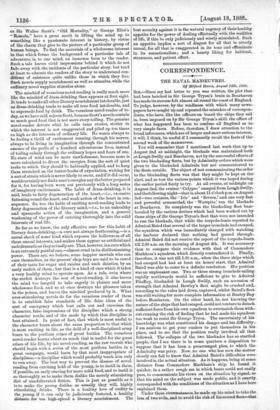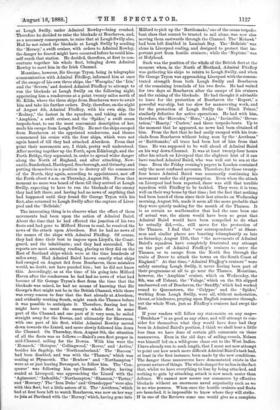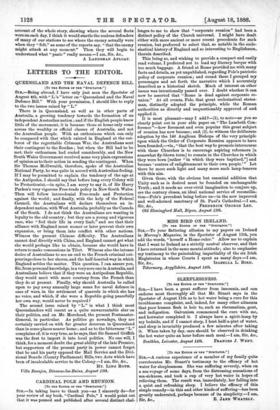CORRESPONDENCE.
THE NAVAL MANCEUVRES.
Off Milford Haven, August 14t1i, 1888. SI1S,--Since my last letter to you was written, the plot that had been hatched in Sir George Tryon's brain in Bearhaven_ has made its success felt almost all round the coast of England. To judge, however, by the readiness with which many news- papers have caught up and repeated the mistakes of correspon- dents, who have, like the officers on board the ships they sail in, been imposed on by Sir George Tryon's skill, the effect of what has happened has been to confuse all England as to. very simple facts. Before, therefore, I draw attention to the broad inferences, which are of larger and more serious interest, it will, I think, be useful if I summarily recall the facts of the - second week of the manceuvres.
You will remember that I mentioned last week that up to- August 2nd at midnight, the blockade was maintained both at Lough Swilly and Bearhaven, not by the successful efforts of the two blockading fleets, but by Admiralty orders which were- given to the blockaded Admirals, but not communicated to the fleets outside. The object of not communicating the order to the blockading fleets was that they might be kept on the- alert, and so test the various points which it was hoped during the earlier period fairly to try. At all events, at midnight on August 2nd, the cruiser 'Calypso' escaped from Lough Swilly, and the following night—that is, about 11 o'clock p.m. on August 3rd—two cruisers, the 'Iris' and Severn,' and one very fast and powerful armourcled, the Warspite,' ran the blockade at Bearhaven. So completely was the blockading fleet bam- boozled by the various devices which had been worked out by those ships of Sir George Tryon's fleet that were not intended to ran the blockade, that while the torpedo-boats reported to Admiral Baird that several of the larger ironclads had escaped,. the squadron which was immediately charged with watching the harbour declared that nothing had passed through - Admiral Baird did not receive the report of the torpedo-boats till 2.30 a.m. on the morning of August 4th. It was necessary then to compare their evidence with that of Commodore tfaxkham's squadron, which directly contradicted it. Finally,. therefore, it was not till 5.30 a.m., when the three ships which had escaped had had at least six hours' start, that Admiral' Baird was able to come to a definite resolution. His position was an unpleasant one. Two or three strong ironclads rapidly northwards would be sufficient to give to Admiral FitzRoy, blockaded in Lough Swilly, such an accession of strength that Admiral Rowley's fleet might be crashed and,. according to the rules laid down, captured, whilst Baird's fleet- was still waiting for more complete information at Bantry Bay before Bearhaven. On the other hand, he, not knowing the nature of the ships that had escaped, could not venture to detach sufficient force from his own squadron to overmatch them with- out running the risk of finding that he had made his squadron too weak to resist Sir George Tryon. The uncertainty of his knowledge was what constituted his danger and his difficulty.. I am anxious to get your readers to put themselves in his place, and to see that the position really involved, all that followed. The collapse of the two blockades has so startled people, that I see there is in some quarters a disposition to suppose that it has been a prearranged plan, to which the Admiralty was privy. Now, no one who has seen the matter closely can fail to know that Admiral Baird's difficulties were. involved in the actual situation. As it happens, being at some distance from Commodore Markham's ship, he found it quicker, in a rather rough sea in which boats could not easily pass, to communicate his views on the situation by signal, so that his mind on the subject was made public, and it exactly corresponded with the conditions of the situation as I have here explained them.
Under these circumstances, he made up his mind to take the less of two-evils, and to avoid the risk of his second fleet—that at Lough Swilly, under Admiral Rowley—being crushed. 'Therefore he decided to raise the blockade at Bearhaven, and, as a necessary consequence, to raise that at lough Swilly also, Had he not raised the blockade at Lough Swilly by sending the Mersey,' a swift cruiser, with orders to Admiral Rowley, the clgnger he feared might have occurred before he could him. .self reach that station. He decided, therefore, at first to con- centrate together his whole fleet, bringing down Admiral Rowley to meet him in the Irish Channel. .
Meantime, however, Sir George Tryon, being in telegraphic .communication with Admiral FitzRoy, informed him at once of the escape of his own three ships, the Warspite,' the Iris,' and the Severn,' and desired Admiral FitzRoy to attempt to run the blockade at Lough Swilly on the following night, appointing him a rendezvous at a point twenty miles north of St Kilda, where the three ships from Bearhaven were to await him and take his further orders. Duly, therefore, onthe night of August 4th, Admiral FitzRoy, with his own ship, the Rodney,' the fastest in the squadron, and taking also the Amphion,' a swift cruiser, and the Spider,' a swift ocean torpedo-boat, to use the most convenient description of her, made his escape from Lough Swilly. He met the ships escaped from Bearhaven at the appointed rendezvous, and thence 'commenced his cruise with the four ships, which were not again heard of till they had attacked Aberdeen. From that point their movements are, I think, pretty well understood. After moving together up the Forth, upon Edinburgh, and the Forth Bridge, they separated, in order to spread wider danger .along the North of England, and after attacking, New- ca,stle, Sunderlan,d, Hartlepool, Scarborough, and Grimsby, and putting themselves in a position to destroy all the commerce ..of the North, they again, according to appointment, met off the Forth about 4 a.m. on Thursday, August 9th. From that moment no more was heard of them till they arrived at Lough Swilly, expecting to have to run the blockade of the enemy they had left there, and having had no news of anything that had happened until they found Sir George Tryon with his fleet, also returned to Lough Swilly after the capture of Liver- pool and the Belleisk.'
The interesting thing is to observe what the effect of these movements had been upon the action of Admiral Baird. About the time.that he had effected the junction of his two fleets and had gone to Milford Haven to coal, he received the news of the attack upon Aberdeen. But he had no news of the names of the ships with Admiral FitzRoy. Of course, they had done their best to impose upon Lloyd's, the Coaet- _guard, and the inhabitants ; and they had succeeded. The reports are most amusing reading, placing OS they did on the- East of Scotland ships which were at the time hundreds of miles away. Had Admiral Baird known exactly what ships had escaped on August 3rd from Bearhaven, these mistakes would, no doubt, not have puzzled him ; but he did not know this. Accordingly, as at the time of his going into Milford Haven after the rendezvous he had had no news of what had become of Sir George Tryon's fleet from the time that the blockade was raised, he had no means of knowing that Sir -George's fleet might not be in the British Channel, while there was every reason to fear that the fleet already at Aberdeen, and evidently working South, might reach the Thames before it was possible to anticipate it. Therefore, fearing lest he might have to meet the enemy's whole fleet in some part of the Channel, and one part of it very soon, he sailed straight away for the Downs, and ultimately for Sheerness, -with one part of his fleet, whilst Admiral Rowley moved down towards the Lizard, and more slowly followed him down the Channel. On Thursday, then, August 9th, the situation of all the fleets was as follows :—Baird's own fleet proper in mid-Channel, sailing for the Downs. With him were the
Monarch," Hotspur,' Collingwood," Rover,' and Active,' besides his flagship, the Northumberland.' The 'Racoon' had been disabled, and was with the Thames,' which was coaling at Plymouth. The • Benbow ' and 'Northampton' were at or just leaving Devonport, to follow him. The Con- queror ' was following him up-Channel. Rowley, having coaled at Liverpool, was approaching the Lizard with the Agincourt," Inflexible," Northampton,' Shannon," Tartar,' and `Mercury.' The Iron Duke' and 'Grasshopper' were also
with this fleet, but a little astern of it. The Arethnsa,' which had at first been left to watch Bearhaven, was now on her way to join at Portland with the Mersey,' which, having gone into Milford to pick up the Rattlesnake,' one of the ocean torpedo- boat class that cannot be trusted to sail alone, was now also moving them eastwards through the Channel The 'Mohawk' had been left disabled in Lai:alas/1 Bay. The Belleisle ' was gene in Liverpool coaling, and designed to protect that im- portant port from hostile cruisers ; while the 'Neptune' was at Holyhead.
Such was the position of the whole of the British fleet at the moment when, in. the North of Scotland, Admiral FitzRoy was gathering his ships to retUrn to Lough Swilly, and when Sir George Tryon was approaching Liverpool with the concen- trated strength from both Lough Swilly and Bearhaven of the remaining ironclads of his two fleets. He had waited for two days at Bearhaven after the escape of his cruisers and the raising of the blockade. He had thought it advisable to leave for the protection of Bearhaven the Rupert:, a powerful war-ship, but too slow for manoeuvring work, and for the protection of Lough Swilly the Black Prince,' similarly defective for active operations. He had with him, therefore, the 'Hercules," Hero,' Ajax," 'Invincible,' Hearty," Curlew,' and three torpedo-boats. Up to the moment that he appeared, no news had been obtained of him. From the fact that he had easily escaped with his iron- clads from Bearhaven without being seen by the Arethusa ' or Rattlesnake,' all trace had been lost of him from that time. He was supposed to be well ahead of Admiral Baird on his -way down-ChanneL It was at least twenty-four hours after his attack on Liverpool that the slightest hint of it can have reached Admiral Baird, who was well out to sea at the time. Even the Friday evening's papers in London contained only the most confused accounts. Therefore, for those twenty- four hours Admiral Baird was necessarily continuing his movement under the old presumption. Even when the attack on Liverpool had been reported, there was still that terrible squadron with FitzRoy to be tackled. They were, it is true, well on their way home by that time ; but the fact that nothing had been heard of them since their last attacks on Wednesday morning, August 8th, made it seem all the more probable that they were quietly making for the mouth of the Thames. It is as certain as mathematics that had the case been one of actual war, the alarm would have been so great that Admiral Baird would have been compelled to do what he actually did,—viz., still move for the protection of the Thames. I find that "our correspondents" at Sheer- ness and similar places are boasting triumphantly as late as Saturday, August 11th, that "the movements of Admiral Baird's squadron have completely frustrated any attempt on the part of Admiral FitzRoy's cruisers to enter the Thames, or to escape from the North Sea through the traits of Dover to attack the towns on the South Coast of England." At that time," Admiral Fitakloy's cruisers" were safely entering Lough Swilly, it never having been part of their programme at all to go near the Thames. Meantime, however, the Amphion ' cruiser, which on Wednesday, the 8th, was off Ushant, the Volage,' which on the 9th slipped unobserved out of Bearhaven, the Sandfly,' which had worked round to Queenstown, the 'Calypso' and the Spider,' working from Lough Swilly, were all, without molestation, threat, or hindrance, preying upon English commerce through- out the whole West, just as FitzRoy's cruisers had swept the East.
If your readers will follow ray statements on any map.— "Bradshaw" is as good as any other, and will attempt to con- sider for themselves what they would have done had they been in Admiral Baird's position, I think we shall hear a little
less than we have done of certain glib comments on these manoeuvres. Even in the old days of sailing-vessels, Nelson was himself led on.a wild-goose chase out to the West Indies. I have already run to such length, that I must not now attempt to point out how much more difficult Admiral Baird's task had, at least in the first instance, been made by the new conditions. The danger these manoeuvres have demonstated exists in the present nature of things. The whole danger for us lies in the fact that, whilst we have everything to lose by being attacked, and. nothing to gain by attacking, attack is now mach easier than defence. We cannot now secure our commerce by effective blockade without an enormous naval superiority such as we in no wise possess. When once the hostile cruisers and fleets are launched, it is impossible to know where they will strike. If in one of the Reviews some one would give us a complete account of the whole story, showing where the several fleets were on each day, I think it would startle the zealous defenders of many of our stations to see where the enemy actually were when they "felt," as some of the reports say, "that the enemy might attack at any moment." Then they will begin to understand what " panic " really means.—I am, Sir, Stc.,
A LANDSMAN AFLOAT.




































 Previous page
Previous page